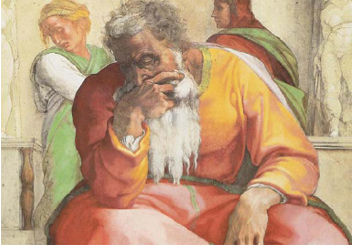One day Jesus asked His disciples, ‘Who do people say that I am?’” You can find that account in Matthew 16:13. Our minds tend to remember the follow up question (“But who do you stay that I am?,” v.15) more than the answer the disciples gave.
Interestingly, the disciples reported the names of three individuals that Jesus made people think of (v.14). The first was John the Baptist. No big surprise there. John and Jesus had been linked for a long time. Jesus submitted Himself to John’s baptism. With John now martyred, they probably though John had come back to life. The second was Elijah. Again, no big surprise. Elijah was the unparalleled miracle worker of the Old Testament. Jesus did so many miracles it is natural they would have likened him to Elijah. But the third individual that people identified Jesus as might surprise us: Jeremiah.
Why Jeremiah?
While Scripture does not explicitly name Jeremiah as a type of the Messiah, there are many suggestive parallels between the two. Here are some of those proposed by Dr. James T. Dennison, Jr. with a few more I’ve added.
Reality Jeremiah Jesus
Suffering Jer. 4:19 Luke 24:46
Rejection Jer. 1:17 Luke 9:22
Spurned proclamation Jer. 7:27 Matt. 13:13
Denunciation Jer. 20:10 Matt. 11:19
Object of conspiracy Jer. 11:9, 19 Matt. 26:4
Mockery Jer. 20:6 Luke 22:63
Plotted against Jer. 18:18 Mark 14:1
Arrested Jer. 37:13-14 John 18:12
Beaten Jer. 20:2; 37:15 Luke 22:63
Condemned Jer. 38:9 Luke 24:20
Publicly humiliated Jer. 20:2; 29:26 Matt. 27:28-31
Incarcerated Jer. 38:6 Matt. 27:1-2
Born of humble, rural surroundings Jer. 1:1 Matt. 2:23
Forced to live in Egypt Jer. 43:5-7 Matt. 2:19
Chosen before birth by God Jer. 1:5 John 3:16
Predicted destruction of the temple Jer. 7:14 Matt. 24:1-2
Predicted the fall of the nation Jer. 20:4 Matt. 24:34
Draws enmity of listeners Jer. 18:10 John 15:18
His own people plot his death Jer. 11:21 Luke 4:16-29
Religious leaders call for his death Jer. 26:8, 11 John 19:6
Innocence proclaimed by some Jer. 26: 16 John 18:38
Bound over to death Jer. 26:8 Mark 15:15
Condemned for telling the truth Jer. 26:15 John 8:45-46
Preached in the temple Jer. 7, 26 John 7:28
Struck by/before a priest Jer. 20:1-2 John 18:19-22
Died forsaken Jer. 43:5-7 Mk. 15:34, 37
Isaiah said the Messiah would be a “man of sorrows” (Isa. 53:3). “Jesus wept” at Lazurus’s tomb (John 11:35). Even as Jesus approached the city of Jerusalem to official present Himself to her as the long anticipated King, “he wept over” the city (Luke 19:14), anticipating their rejection and the inevitable judgment that must befall her. “In the days of his flesh, Jesus offered up prayers and supplications, with loud cries and tears …” (Heb. 5:7a).
Jeremiah has often been dubbed “the weeping prophet.” Many saw the grief-burden Jesus carried about as He was rejected by those around Him. His tears, His grief, His sorrows—it all reminded them of someone. Both Jesus and Jeremiah understood lament. They both knew grief and grieving.
“Concerning this salvation, the prophets [of whom Jeremiah was one] who prophesied about the grace that was to be yours searched and inquired carefully, inquiring what person or time the Spirit of Christ in them was indicating when he predicted the sufferings of Christ and the subsequent glories” (1 Peter 1:10-11).
Jeremiah’s sufferings carried no atoning value. Christ is the only Savior. And part of Jesus’ saving work is to remind us all—Old Testament prophet or New Testament saint—that if you find yourself burdened, broken, bereft, and if at times you feel like bawling your eyes out, know this: you are in good company.
Jesus asks still, “Who do people say that I am?”
I answer, “You are ‘The LORD [who] is near to the brokenhearted and saves the crushed in spirit’” (Psalm 34:1).


Leave a Reply